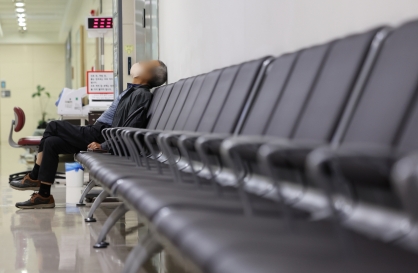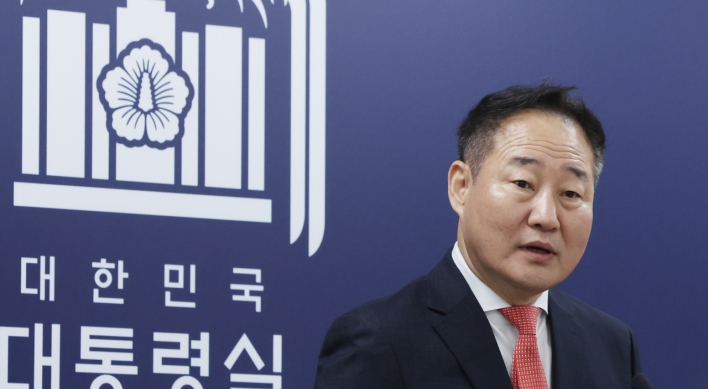Stakes raised for Seoul summit after IMF meet fails to calm tension
Korea is facing a daunting challenge of mediating global economic powers engaging in the so-called “currency war” in the lead up to the November Group of 20 Summit in Seoul.
After the annual meeting of the International Monetary Fund in Washington, D.C. over the weekend, the currency issue is emerging as a significant factor in determining the success of the G20 forum.
Finance ministers and central bank governors of the member countries are scheduled to meet in Gyeongju on Oct. 22-23 ahead of the summit in Seoul held on Nov. 11-12.
The stakes of the G20 have increased as the IMF members concluded talks without reaching any solution to rising tensions over foreign exchange rates.
If major countries were to hammer out an agreement at the Seoul summit, their finance ministers have to discuss substantial solutions in Gyeongju.
Ranking officials of the Presidential Committee for the G20 Summit recently said they would be able to make some progress through a series of meetings ahead of the event.
Committee chairman SaKong Il told The Korea Herald last week that he thinks the issue will be discussed for about a month on a step-by-step basis “among finance ministers before beginning of the November summit.”
Korea is facing a daunting challenge of mediating global economic powers engaging in the so-called “currency war” in the lead up to the November Group of 20 Summit in Seoul.
After the annual meeting of the International Monetary Fund in Washington, D.C. over the weekend, the currency issue is emerging as a significant factor in determining the success of the G20 forum.
Finance ministers and central bank governors of the member countries are scheduled to meet in Gyeongju on Oct. 22-23 ahead of the summit in Seoul held on Nov. 11-12.
The stakes of the G20 have increased as the IMF members concluded talks without reaching any solution to rising tensions over foreign exchange rates.
If major countries were to hammer out an agreement at the Seoul summit, their finance ministers have to discuss substantial solutions in Gyeongju.
Ranking officials of the Presidential Committee for the G20 Summit recently said they would be able to make some progress through a series of meetings ahead of the event.
Committee chairman SaKong Il told The Korea Herald last week that he thinks the issue will be discussed for about a month on a step-by-step basis “among finance ministers before beginning of the November summit.”

He emphasized that an agreement without prior fine-tuning among global working-level officials at the November meeting will not be possible.
With SaKong’s remarks and the meagre outcome at the IMF meeting, G20 members, including Asian countries whose currencies are under pressure to gain against the U.S. dollar, will likely brace for unpredictable debates.
Namely, more members are expected to regard the currency issue as a summit agenda even if it will not be adopted as an official one.
U.S. Treasury Secretary Timothy Geithner said Saturday that the IMF must strengthen its surveillance of exchange rate policies.
Bank of Korea Governor Kim Choong-soo, who also attended the IMF meeting, said, “Korea should assume the leadership as the chair of the summit as we need the process of coordinating exchange rates between the two countries (the U.S. and China) or a number of countries.”
While IMF managing director Dominique Strauss Kahn said he disliked the notion that a currency war was brewing because the term was too military, central bank governor Kim issued the possibility of a (more serious) currency war under ongoing disharmony among countries.
Kim’s remark shows that Korea has already shifted its position after President Lee Myung-bak said Thursday that the currency issue will be one of the agendas for the Seoul meeting.
But Strauss-Kahn also agreed that foreign exchange and imbalance issues are not separate from development issues, while several nations and organizations claimed that the currency disputes will not overshadow talk of development at the G20 meeting.
An issue is the monetary policy of Korea which is also under pressure to raise its currency value.
Some say the nation’s policymakers and the BOK have actively intervened in the market top block further stronger position of the Korean won, while some say the nation is refraining from intervening as it is the G20 president.
Several analysts say Korea has already lost the power to cool down its currency price and gave up the active intervention.
Governments of India, Brazil, Thailand and Peru are stepping up efforts to control their currencies in order to absorb a record amount of money flowing into their emerging markets.
Brazil has doubled its tax on fixed-income securities for foreigners to 4 percent. Thai authorities also said it is mulling ways to curb the baht which has risen to a 13-year high.
U.S. President Barack Obama and a trio of top eurozone officials have urged Chinese Premier Wen Jiabao to make the renminbi more flexible
By Kim Yon-se (kys@heraldcorp.com).






![[K-pop’s dilemma] Time, profit pressures work against originality](http://res.heraldm.com/phpwas/restmb_idxmake.php?idx=644&simg=/content/image/2024/05/08/20240508050705_0.jpg&u=20240508171126)
![[K-pop’s dilemma] Can K-pop break free from ‘fandom’ model?](http://res.heraldm.com/phpwas/restmb_idxmake.php?idx=644&simg=/content/image/2024/05/09/20240509050541_0.jpg&u=20240509173751)










